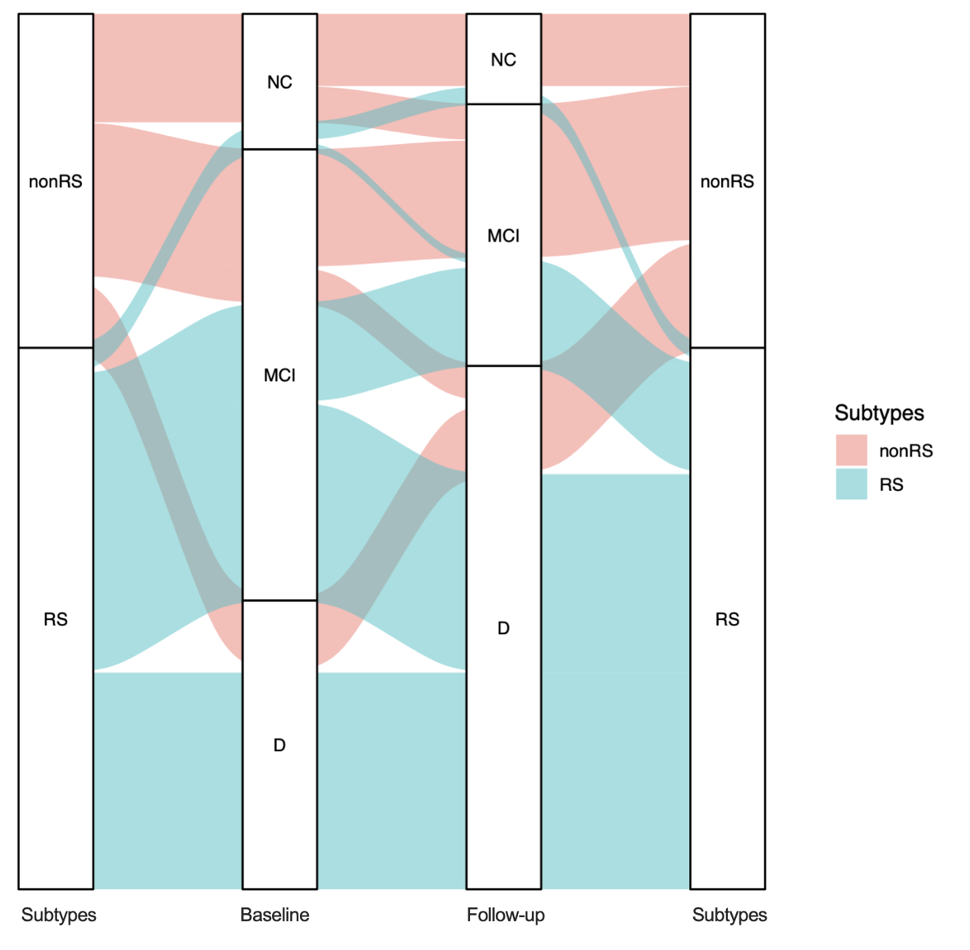Category: Parkinsonism, Atypical: PSP, CBD
Objective: Based on a relatively large cohort, we aimed to show the switch of cognitive status in patients with progressive supranuclear palsy (PSP) after one-year follow-up and explore the potential contributors for prognosis in the futures.
Background: Nowadays, cognitive impairment has been characterized as one of the most vital clinical symptoms in patients with PSP. High prevalence and severity of cognitive dysfunction were gradually recognized in clinical course.
Method: From Progressive Supranuclear Palsy Neuroimage Initiative (PSPNI) cohort, 97 patients with clinical diagnosed PSP who underwent one-year follow-up, including clinical assessment and neuropsychological tests, were recruited in this study. Patients were divided into normal cognition (PSP-NC), mild cognitive impairment (PSP-MCI) and dementia (PSP-D) according to the diagnostic criteria. MCI converter was defined as those who were PSP-MCI at baseline converted to PSP-D after the follow-up. Paired t test was used for analyzing the difference between baseline and follow-up. The determinants of MCI conversion were calculated by multiple cox regression.
Results: There were 32 patients with PSP were diagnosed as PSP-D (33.0%), 50 patients were diagnosed as PSP-MCI (51.6%), and only 15 patients were diagnosed as PSP-NC (15.5%) at baseline. More than half of patients with PSP-MCI (26/50) converted to Dementia subgroup at the time of follow-up. Extremely rapid disease progression (motor and non-motor symptoms) was found in MCI converters rather than in MCI non-converters. The difference between the two subgroups included higher proportion of Richardson syndrome (RS) subtype (p=0.007), more severely impaired executive functions (p=0.032), language (p=0.035), attention (p=0.029), and non-motor symptoms (p=0.013) in the patients of MCI converter subgroup. Among all the important demographic and clinical variables, the diagnosis of RS subtype was found to be the most significant contributor for the occurrence of the MCI conversion (HR: 3.608, 95% CI: 1.373, 5.997, p=0.009).
Conclusion: The heavy cognition burdens and rapid cognition deteriorations should be well recognized in the PSP. The PSP-RS subtype was the most important predictor to the short-term MCI conversion to dementia in PSP. Our work will be helpful in making a clear prognosis of PSP in the future.
Proportion change of subtypes in PSP
To cite this abstract in AMA style:
XY. Li, G. Tang, FT. Liu, J. Wang. Rapid Cognitive Deterioration and Related Factors in Progressive Supranuclear Palsy: a One-Year Follow-up Study [abstract]. Mov Disord. 2024; 39 (suppl 1). https://www.mdsabstracts.org/abstract/rapid-cognitive-deterioration-and-related-factors-in-progressive-supranuclear-palsy-a-one-year-follow-up-study/. Accessed April 26, 2025.« Back to 2024 International Congress
MDS Abstracts - https://www.mdsabstracts.org/abstract/rapid-cognitive-deterioration-and-related-factors-in-progressive-supranuclear-palsy-a-one-year-follow-up-study/

